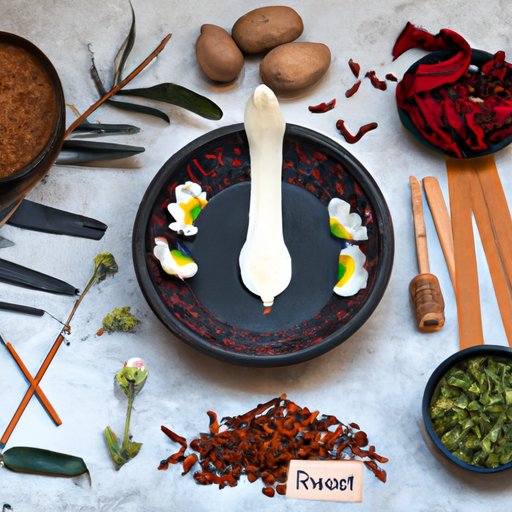
I. Introduction
Menstrual cramps are a common experience for people who have periods, and they can be uncomfortable and disruptive. Most people will experience menstrual cramps at some point in their lives, but there are natural and effective ways to manage them. In this article, we will explore a variety of approaches to relieve bad period cramps, from heat therapy to yoga and meditation, as well as herbs and spices, dietary changes, and self-care practices.
II. The Power of Heat Therapy: Exploring the Benefits of Heating Pads and Hot Water Bottles
One of the most effective ways to alleviate menstrual cramps is through heat therapy. Heat can help relax muscles and increase blood flow, reducing pain and discomfort. There are several ways to apply heat, including heating pads and hot water bottles. It’s essential to use these devices safely and effectively, such as by placing a towel between the skin and the heat source and not falling asleep with a heating pad or hot water bottle on the body.
III. Mind and Body Connection: Practicing Yoga and Meditation to Alleviate Menstrual Cramps
The mind-body connection is powerful, and stress and tension can contribute to menstrual cramps. Yoga and meditation are helpful for managing stress and reducing menstrual discomfort. Specific yoga poses and meditation techniques, such as child’s pose and deep breathing exercises, are beneficial during menstruation and can help alleviate pain and tension.
IV. Spice Up Your Life: Using Herbs and Spices as Natural Remedies for Menstrual Pain
Herbs and spices have been traditionally used for menstrual pain and can be highly effective. Ginger, chamomile, and cinnamon are commonly used spices that work by reducing inflammation and improving circulation. It’s important to note that while natural remedies are safe for most people, it’s always wise to check with a healthcare provider before using a new treatment, particularly if medications are already being taken.
V. Ditching the Caffeine: Why Cutting Back on Coffee and Other Stimulants May Help with Menstrual Cramps
Caffeine and other stimulants can exacerbate menstrual cramps, so it’s essential to consume them in moderation. It’s best to gradually reduce intake to avoid withdrawal symptoms, and alternatives like herbal teas and energy-rich foods can replace the stimulating beverages and snacks. It’s also wise to stay hydrated and eat fiber-rich foods to aid digestion and improve bowel movements.
VI. Ease the Pain with a Balanced Diet: How Proper Nutrition Can Combat Menstrual Cramping
A balanced diet is crucial for overall health, and specific nutrients and foods can help alleviate menstrual cramps, such as magnesium and omega-3 fatty acids. Incorporating foods like avocados, dark leafy greens, fatty fish, and nuts and seeds can provide these nutrients and reduce inflammation. Additionally, eating protein and complex carbohydrates can provide steady energy levels, which is essential for reducing fatigue and menstrual discomfort.
VII. The Importance of Self-Care: Taking Time for Yourself to Reduce Stress and Relieve Menstrual Discomfort
Self-care practices are helpful for managing menstrual cramps, and taking time for yourself is essential during menstruation. It may involve taking a warm bath, reading a book, doing gentle yoga, or spending time in nature. Whatever one chooses to do should promote relaxation and reduce stress levels.
VIII. Conclusion
Menstrual cramps can be challenging to manage, but there are natural and effective ways to alleviate the discomfort. From heat therapy to dietary changes, herbs and spices, and self-care practices, there are several approaches to explore and find what works best. It’s essential to remember that one size doesn’t fit all, so be patient and keep exploring. Lastly, if the cramps are severe and affect daily life, it’s wise to check with a healthcare provider to rule out any underlying conditions.





